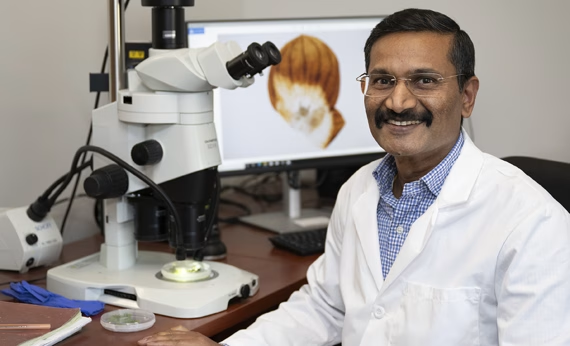Contact: Jack Bailey
(304) 766-4109
jbaile19@wvstateu.edu
FOR IMMEDIATE RELEASE
INSTITUTE, W.Va. — The West Virginia State University (WVSU) Energy and Environmental Science Institute has discovered how plants develop tolerance to heavy metals when exposed to wastewater from flue gas desulfurization (FGD).
The wastewater generated by FGD at coal-fired power plants contains trace amounts of toxic heavy metals; if this untreated wastewater is used for agricultural irrigation, the metals can accumulate in crops and enter the food chain, posing health risks.
However, according to a recently published article in the Journal of Hazardous Materials (Impact factor 13.6), WVSU Energy and Environmental Science Institute Director Dr. Sanju Sanjaya and his team discovered a new phenomenon: how plants respond to and develop tolerance for the heavy metal stress induced by FGD wastewater. The team employed multiple methods to identify the molecular mechanisms that allow this tolerance, which could enable safe agricultural production in environments contaminated with heavy metals.
“Heavy metals in FGD wastewater are concerning because plants readily absorb them, allowing the
metals to enter the food chain and human diet through biomagnification,” Sanjaya said. “Understanding
plants’ genetic responses to heavy metals in FGD wastewater, and using that knowledge to develop wastewater-tolerant plants, offer a sustainable solution for addressing heavy-metal contamination in water or soil.”
Lead author Bagyalakshmi Muthan said, “By elucidating heavy metal tolerance mechanisms in plants
and identifying new regulatory genes, this research paves the way for designing resilient crops that can feed our
growing population in the face of global climate change.”
Other members of Sanjaya’s team and paper co-authors are Bikash Deo and Subhiksha Kathawada,
former students in the biotechnology graduate program at WVSU. The project also involves collaborators from several institutions and is funded by the U.S. Department of Energy, U.S. Department of Defense and the USDA National Institute of Food and Agriculture.
For further information and to access the full research publication, please visit
https://doi.org/10.1016/j.jhazmat.2024.133951.
Follow West Virginia State University and WVSU Extension Service on Facebook and Twitter @WVStateU.
West Virginia State University is a public, land grant, historically black university, which has evolved into a fully accessible, racially integrated, and multi‐generational institution, located in Institute, W.Va. As a "living laboratory of human relations," the university is a community of students, staff, and faculty committed to academic growth, service and preservation of the racial and cultural diversity of the institution. Its mission is to meet the higher education and economic development needs of the state and region through innovative teaching and applied research.
West Virginia State University is an equal opportunity/affirmative action institution. It does not discriminate against any person because of race, color, religion, sex/gender, national origin, ancestry, age, blindness, disability, pregnancy, genetic information, sexual orientation, gender identity, veteran or military status or other category that is protected under federal, state or local anti-discrimination laws as protected characteristics.
